Subsection 1 of Section 83 of the Act in no uncertain terms states that provisional attachment can be ordered only qua property, including bank account, belonging to the taxable person. Furthermore, the definition of the “taxable person”, as set out in Section 2(107) of the Act, provides that only that person can be a taxable person, who is registered or liable to be registered as per the Act. This was held in ROSHNI SANA JAISWAL v. COMMISSIONER OF CENTRAL TAXES, GST DELHI (EAST) [W.P.(C) 2348/2021] in the High Court of Delhi by a division bench consisting of JUSTICE RAJIV SHAKDHER and JUSTICE TALWANT SINGH.
Facts are that the Petitioner was acting as a director on the Board of Directors of the company Milkfood Ltd., between 2006 and 2008. The respondent had commenced an investigation, under Section 67 of the Central Goods and Services Tax Act, 2017 against Milkfood Ltd and an order was passed whereby several bank accounts of the petitioner have been provisionally attached. Aggrieved by the action of the respondent the petitioner has filed the petition.
The counsel for the respondent submitted that the petitioner had availed of the alternate remedy available to it under Rule 159(5) of the Central Goods and Services Tax Rules, 2017 by filing objections under the said Rule, albeit during the pendency of the writ petition.
The counsel on behalf of the petitioner submitted that the proceeding initiated against the petitioner under Section 83 of the Act is without jurisdiction, as the petitioner does not fall within the ambit of the definition of a “taxable person”, the taxable person being Milkfood Ltd and not the petitioner. The other ingredients, provided in Section 83 of the Act, are also missing.
The court made in order to determine its jurisdiction to entertain the instant petition under Article 226 of the Constitution made reference to the judgment delivered by the Supreme Court in Calcutta Discount Co. Ltd. vs. ITO, wherein it had been observed that “28. In the present case, the Company contends that the conditions precedent for the assumption of jurisdiction under Section 34 were not satisfied and come to the court at the earliest opportunity. There is nothing in its conduct that would justify the refusal of proper relief under Article 226. When the Constitution confers on the High Courts the power to give relief it becomes the duty of the courts to give such relief in fit cases and the courts would be failing to perform their duty if relief is refused without adequate reasons. In the present case we can find no reason for which relief should be refused.”
Considering the facts of the petition, the legal provisions, and the precedents the court held that the respondent has not been able to prove that the petitioner is either registered or was liable to be registered in terms of the provisions of Section 2(107) of the Act. Therefore the proceedings must fail on this score alone. Thus quashing the provisional attachment orders, the court stated that the proceedings carried out against the petitioner were without jurisdiction.


